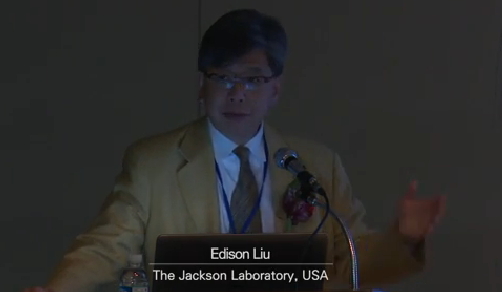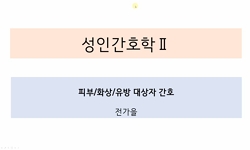Purpose: A CXCR4/stroma derived factor-1α(SDF-1α, CXCL12) interaction is involved in many metastatic cancer mechanisms, including breast cancer. The primary objectives of this study were to investigate the correlation between CXCR4 and axillary lymp...
http://chineseinput.net/에서 pinyin(병음)방식으로 중국어를 변환할 수 있습니다.
변환된 중국어를 복사하여 사용하시면 됩니다.
- 中文 을 입력하시려면 zhongwen을 입력하시고 space를누르시면됩니다.
- 北京 을 입력하시려면 beijing을 입력하시고 space를 누르시면 됩니다.
https://www.riss.kr/link?id=A104426787
-
저자
Jong-Ok Kim (Catholic University) ; Kwang-Sun Suh (Chungnam National University) ; Dong-Ho Lee (Catholic University) ; Hae-Joung Sul (Catholic University) ; Jung-Uee Lee (Catholic University) ; Kyu-Sang Song (Chungnam National University)
- 발행기관
- 학술지명
- 권호사항
-
발행연도
2009
-
작성언어
English
- 주제어
-
등재정보
KCI등재후보,SCIE,SCOPUS
-
자료형태
학술저널
-
수록면
249-256(8쪽)
-
KCI 피인용횟수
2
- 제공처
-
0
상세조회 -
0
다운로드
부가정보
다국어 초록 (Multilingual Abstract)
Purpose: A CXCR4/stroma derived factor-1α(SDF-1α, CXCL12) interaction is involved in many metastatic cancer mechanisms, including breast cancer. The primary objectives of this study were to investigate the correlation between CXCR4 and axillary lymph node metastasis and to clarify the interaction between CXCR4 in primary tumor cells and SDF-1αin metastatic lymph nodes. An analysis of the correlation between CXCR4, SDF-1αand clinicopathologic features was also performed. Methods: Representative
areas from 44 invasive ductal carcinomas were selected for construction of tissue microarrays using a 5 mm punch. Breast cancers (n=44), metastatic axillary lymph nodes (n=18) and non-metastatic axillary lymph nodes (n=26) were immunohistochemically stained for CXCR4, SDF-1α, estrogen receptor
(ER), progesterone receptor (PR) and HER2. The parameters of age, tumor size, nuclear grade, histologic grade, lymph node status and pathologic node (pN) stage pN0 to pN3 were evaluated. Results: CXCR4 expression was negatively correlated with increased age (p=0.005) and positively correlated with a large tumor size (p=0.043) and PR expression (p=0.027). CXCR4 expression was not correlated with metastatic lymph nodes (p=0.079) and SDF-1αexpression in metastatic lymph nodes (p=0.062). However, CXCR4
nuclear positivity is correlated with lymph node metastasis (p=0.044). SDF-1αwas not correlated with any clinicopathologic feature in a statistically significant manner. Conclusion: An evaluation of young age, large tumor size and PR expression helps predict lymph node metastasis and poor prognosis.
Expression of CXCR4 nuclear positivity is correlated with a poor prognosis.
참고문헌 (Reference)
1 Balkwill F, "The significance of cancer cell expression of the chemokine receptor CXCR4" 14 : 171-179, 2004
2 Salvucci O, "The role of CXCR4 receptor expression in breast cancer: a large tissue microarray study" 97 : 275-283, 2006
3 Kang H, "The elevated level of CXCR4 is correlated with nodal metastasis of human breast cancer" 14 : 360-367, 2005
4 Wagner PL, "The chemokine receptors CXCR4 and CCR7 are associated with tumor size and pathologic indicators of tumor aggressiveness in papillary thyroid" 15 : 2833-2841, 2008
5 Pan J, "Stromal derived factor-1 (SDF-1/CXCL12) and CXCR4 in renal cell carcinoma metastasis" 5 : 56-, 2006
6 Dewan MZ, "Stromal cell-derived factor-1 and CXCR4 receptor interaction in tumor growth and metastasis of breast cancer" 60 : 273-276, 2006
7 Tsoli E, "Simultaneous evaluation of maspin and CXCR4 in patients with breast cancer" 60 : 261-266, 2007
8 Woo SU, "Significant correlation between nuclear CXCR4 expression and axillary lymph node metastasis in hormonal receptor negative breast cancer" 15 : 281-285, 2008
9 Kijima T, "Regulation of cellular proliferation, cytoskeletal function, and signal transduction through CXCR4 and c-Kit in small cell lung cancer cells" 62 : 6304-6311, 2002
10 Fernandis AZ, "Regulation of CXCR4 mediated chemotaxis and chemoinvasion of breast cancer cells" 23 : 157-167, 2004
1 Balkwill F, "The significance of cancer cell expression of the chemokine receptor CXCR4" 14 : 171-179, 2004
2 Salvucci O, "The role of CXCR4 receptor expression in breast cancer: a large tissue microarray study" 97 : 275-283, 2006
3 Kang H, "The elevated level of CXCR4 is correlated with nodal metastasis of human breast cancer" 14 : 360-367, 2005
4 Wagner PL, "The chemokine receptors CXCR4 and CCR7 are associated with tumor size and pathologic indicators of tumor aggressiveness in papillary thyroid" 15 : 2833-2841, 2008
5 Pan J, "Stromal derived factor-1 (SDF-1/CXCL12) and CXCR4 in renal cell carcinoma metastasis" 5 : 56-, 2006
6 Dewan MZ, "Stromal cell-derived factor-1 and CXCR4 receptor interaction in tumor growth and metastasis of breast cancer" 60 : 273-276, 2006
7 Tsoli E, "Simultaneous evaluation of maspin and CXCR4 in patients with breast cancer" 60 : 261-266, 2007
8 Woo SU, "Significant correlation between nuclear CXCR4 expression and axillary lymph node metastasis in hormonal receptor negative breast cancer" 15 : 281-285, 2008
9 Kijima T, "Regulation of cellular proliferation, cytoskeletal function, and signal transduction through CXCR4 and c-Kit in small cell lung cancer cells" 62 : 6304-6311, 2002
10 Fernandis AZ, "Regulation of CXCR4 mediated chemotaxis and chemoinvasion of breast cancer cells" 23 : 157-167, 2004
11 Uchida D, "Possible role of stromal-cell-derived factor-1/CXCR4 signaling on lymph node metastasis of oral squamous cell carcinoma" 290 : 289-302, 2003
12 Nicolson GL, "Paracrine and autocrine growth mechanisms in tumor metastasis to specific sites with particular emphasis on brain and lung metastasis" 12 : 325-343, 1993
13 Helbig G, "NF-kappaB promotes breast cancer cell migration and metastasis by inducing the expression of the chemokine receptor CXCR4" 278 : 21631-21638, 2003
14 Shim HS, "Lower expression of CXCR4 in lymph node metastases than in primary breast cancers: Potential regulation by ligand-dependent degradation and HIF-1a" 346 : 252-258, 2006
15 Liu F, "Increased expression of SDF-1/CXCR4 is associated with lymph node metastasis of invasive micropapillary carcinoma of the breast" 54 : 741-750, 2009
16 Adams GB, "Heterologous cells cooperate to augment stem cell migration, homing, and engraftment" 101 : 45-51, 2003
17 Möhle R, "Functional response of leukaemic blasts to stromal cell-derived factor-1 correlates with preferential expression of the chemokine receptor CXCR4 in acute myelomonocytic and lymphoblastic leukaemia" 110 : 563-572, 2000
18 Su YC, "Expression of CXCR4 is associated with axillary lymph node status in patients with early breast cancer" 15 : 533-539, 2006
19 Sun YX, "Expression of CXCR4 and CXCL12 (SDF-1) in human prostate cancers (PCa) in vivo" 89 : 462-473, 2003
20 Harvey JM, "Estrogen receptor status by immunohistochemistry is superior to the ligand-binding assay for predicting response to adjuvant endocrine therapy in breast cancer" 17 : 1474-1481, 1999
21 Bae YK, "Estrogen receptor expression in Korean breast carcinoma and comparison of three anti-ER antibodies. abstract #4" 43-, 2009
22 Scotton CJ, "Epithelial cancer cell migration: a role for chemokine receptors?" 61 : 4961-4965, 2001
23 Cabioglu N, "Chemokine receptor CXCR4 expression in breast cancer as a potential predictive marker of isolated tumor cells in bone marrow" 22 : 39-46, 2005
24 Spano JP, "Chemokine receptor CXCR4 and early stage non-small cell lung cancer: pattern of expression and correlation with outcome" 15 : 613-617, 2004
25 Cabioglu N, "CCR7 and CXCR4 as novel biomarkers predicting axillary lymph node metastasis in T1 breast cancer" 11 : 5686-5693, 2005
26 송준선, "Association of CXCR4 Expression with Metastasis and Survival among Patients with Non-small Cell Lung Cancer" 대한병리학회 42 (42): 358-364, 2008
27 Geminder H, "A possible role for CXCR4 and its ligand, the CXC chemokine stromal cell-derived factor-1, in the development of bone marrow metastases in neuroblastoma" 167 : 4747-4757, 2001
동일학술지(권/호) 다른 논문
-
원발성 및 재발성 유방암조직에서 호르몬 수용체, HER2 발현의 변화양상
- 한국유방암학회
- 최정필
- 2009
- KCI등재후보,SCIE,SCOPUS
-
- 한국유방암학회
- 박우찬
- 2009
- KCI등재후보,SCIE,SCOPUS
-
Angiolipoma of the Breast: A Case Report
- 한국유방암학회
- 김신영
- 2009
- KCI등재후보,SCIE,SCOPUS
-
유방암 환자의 F-18 FDG PET/CT 영상에서 우연히 관찰되는 갑상샘의 미만성 섭취 증가의 임상적 의의
- 한국유방암학회
- 정영진
- 2009
- KCI등재후보,SCIE,SCOPUS
분석정보
인용정보 인용지수 설명보기
학술지 이력
| 연월일 | 이력구분 | 이력상세 | 등재구분 |
|---|---|---|---|
| 2023 | 평가예정 | 해외DB학술지평가 신청대상 (해외등재 학술지 평가) | |
| 2020-01-01 | 평가 | 등재학술지 유지 (해외등재 학술지 평가) |  |
| 2011-04-06 | 학술지명변경 | 외국어명 : Journal of Korean Breast Cancer -> Journal of Breast Cancer |  |
| 2011-03-23 | 학술지명변경 | 외국어명 : Journal of Korean Breast Cancer -> 미등록 |  |
| 2011-03-04 | 학술지명변경 | 한글명 : 한국유방암학회지 -> Journal of Breast Cancer |  |
| 2011-01-01 | 평가 | 등재학술지 선정 (등재후보2차) |  |
| 2010-01-01 | 평가 | 등재후보 1차 PASS (등재후보1차) |  |
| 2008-01-01 | 평가 | SCIE 등재 (신규평가) |  |
학술지 인용정보
| 기준연도 | WOS-KCI 통합IF(2년) | KCIF(2년) | KCIF(3년) |
|---|---|---|---|
| 2016 | 1.99 | 0.19 | 1.31 |
| KCIF(4년) | KCIF(5년) | 중심성지수(3년) | 즉시성지수 |
| 0.96 | 0.77 | 0.448 | 0.06 |







 KCI
KCI






